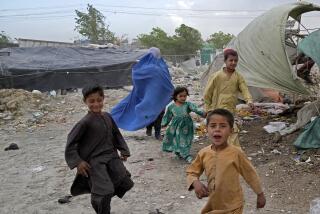Women Cloistered From Cradle to Grave
- Share via
HALA, Pakistan — The untended graves of 70 women who were shrouded in life and hidden in death lie behind a weather-beaten gate that is locked and bolted.
They belong to the Makhdooms, a religious Muslim family whose authority is unchallenged in this dusty town of southern Sind province, where feudal landlords reign supreme.
Makhdoom men are revered, believed to be descendants of the prophet Mohammed. The women are confined to their homes, built of dried mud and brick and enclosed by walls that are 20 feet high and topped with jagged glass.
Most feudal families in Pakistan place restrictions on their women, but the most stringent are imposed by those with religious standing, like the Makhdooms.
Through the generations, little has changed for Makhdoom women.
They lead a cloistered existence from birth and will see no male except their father and brothers. The women of the current generation cannot expect to marry because there are no male first cousins, nor will they leave their homes except at death.
Even for burial, they are wrapped in voluminous shawls and carried to their graves after midnight so no prying eyes will see.
Many Pakistani marriages are between cousins. For the Makhdooms, a marriage must be between first cousins.
Tradition and religion often are cited as reasons for the unyielding treatment of women in Pakistan’s powerful feudal families. Land is another.
“It’s just the land,” a follower of the Makhdooms said on condition of anonymity. “They don’t want to have to give away any land when they marry off a sister.”
Makhdoom Rafique uz-Zamman, 37, said his five sisters--and perhaps his eldest brother’s three daughters--would be the last women in the family to live cloistered lives.
“It’s oppressive,” he said. “As far as i’m concerned, I’m going to marry my daughters.”
Time has passed the sisters by, he said, and “it’s their bad luck.”
The youngest sister is in her early 30s, the eldest in her late 40s. Women friends say that the Makhdoom women are strikingly beautiful, with shimmering, waist-long hair.
A friend who gave her name only as Aysha said conversations with the sisters are monitored and such thought-provoking topics as politics are forbidden for fear that they will be incited to demand freedom.
“We are not allowed to talk about anything stimulating and we are only allowed two hours at the most with them,” said Aysha, a medical student whose father frequently rebukes her for being outspoken.
Except for freedom, the Makhdoom brothers say, their sisters have nearly everything a woman could want.
“They have . . . television, videocassette recorders, radio; they can even cook,” said another brother, Khaleeq uz-Zaman.
There are said to be at least 2,000 women in Sind whose lives are seriously restricted by feudal rules.
Some may eventually marry, but even then they will leave their homes only rarely, covered from head to toe by billowing, tent-like veils.
“This is the most difficult tradition to change,” said Sayed Nasir Shah, an 80-year-old religious leader also believed to be a direct descendant of the prophet. “The world is going so fast. We are still so backward.”
“My two younger brothers argue with me,” he said. “They have girls that are still unmarried and not allowed out of the house. When the airplanes would fly overhead, the women would run inside so the passengers couldn’t see them.” Five years ago, Shah broke with tradition and took his children and grandchildren to Karachi, a bustling port 150 miles to the south.
“Now everyone wants some freedom and we’re giving them some, slowly, slowly,” he said.
Ghulam Mustafa Jatoi a former prime minister who owns about 25,000 acres in Sind, has educated his daughters and they have married outside the family, but within their social class.
Jatoi’s associates consider such liberalism a political liability.
“Don’t say Jatoi educates his daughters,” a spokesman said, on condition his name not be used. “He’ll lose votes.”
More to Read
Sign up for Essential California
The most important California stories and recommendations in your inbox every morning.
You may occasionally receive promotional content from the Los Angeles Times.













